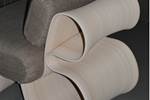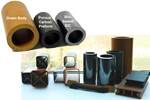Technikum Laubholz opens pilot plant for wood-based carbon fibers
First production phase of WDBSD CF offers sustainable alternative for high-performance composites.

Source | Technikum Laubholz, DITF
Technikum Laubholz (Göppingen, Germany) has opened its pilot plant for the production of its wood-based carbon fiber WDBSD CF. The technology uses renewable resources from regional sources — including hardwoods from sustainably managed forests in the region — to reduce dependence on fossil fuels and minimize environmental impact. According to the company, WDBSD CF provides a sustainable solution for industrial applications where both technological performance and environmental friendliness are required.
“WDBSD CF technology significantly reduces energy consumption in fiber production while providing excellent mechanical properties that are crucial in technical applications,” explains Dr. Rolf Moors, head of fiber-based biopolymer materials at Technikum Laubholz. WDBSD CF is characterized by high thermal resistance, electrical conductivity and mechanical strength, making it a suitable reinforcement for a wide range of applications, including sports equipment, musical instruments, lightweight components for aerospace and transportation interiors, innovative structural designs and energy storage systems. Thus, WDBSD CF enhances the property profile of conventional carbon fiber by providing high strength and low weight while reducing the ecological footprint.
“WDBSD CF allows us to expand the property profile of carbon fibers without relying on fossil resources,” notes Erna Nawrath, fiber development specialist at Technikum Laubholz. “While conventional carbon fibers remain relevant, wood-based carbon fiber offers an environmentally friendly and highly effective alternative.”
The opening of the pilot plant for the production of WDBSD CF is aimed to open up new opportunities for technology transfer and cross-industry collaboration. “WDBSD CF technology opens up new opportunities for companies to create sustainable solutions for a wide range of products,” says Dr. Ing. Tobias Wolfinger, CEO of Technikum Laubholz. “It addresses current demands for resource efficiency, independence from global supply chains and substitution of fossil resources.”

Filament formation using the wet spinning process, enabling sustainable carbon fibers from wood. Source | Technikum Laubholz, DITF
Technikum Laubholz has acquired various patents from the German Institutes of Textile and Fiber Research Denkendorf (DITF). These include sustainable processes for the production of regenerated cellulose fibers and carbon fibers based on lignin and cellulose. At the same time, research projects are undertaking further development of technologies, such as processing cellulose using ionic liquids and introducing novel fiber types for technical applications in the growing market for sustainable materials.
Sustainably produced carbon fibers can be used to produce lightweight components for a wide range of applications including interiors and other structures in mobility. Wood-based carbon parts reduce vehicle weight and thus also drive down energy consumption.
Related Content
-
Hexagon Purus Westminster: Experience, growth, new developments in hydrogen storage
Hexagon Purus scales production of Type 4 composite tanks, discusses growth, recyclability, sensors and carbon fiber supply and sustainability.
-
Natural fiber composites: Growing to fit sustainability needs
Led by global and industry-wide sustainability goals, commercial interest in flax and hemp fiber-reinforced composites grows into higher-performance, higher-volume applications.
-
Watch: A practical view of sustainability in composites product development
Markus Beer of Forward Engineering addresses definitions of sustainability, how to approach sustainability goals, the role of life cycle analysis (LCA) and social, environmental and governmental driving forces. Watch his “CW Tech Days: Sustainability” presentation.


















